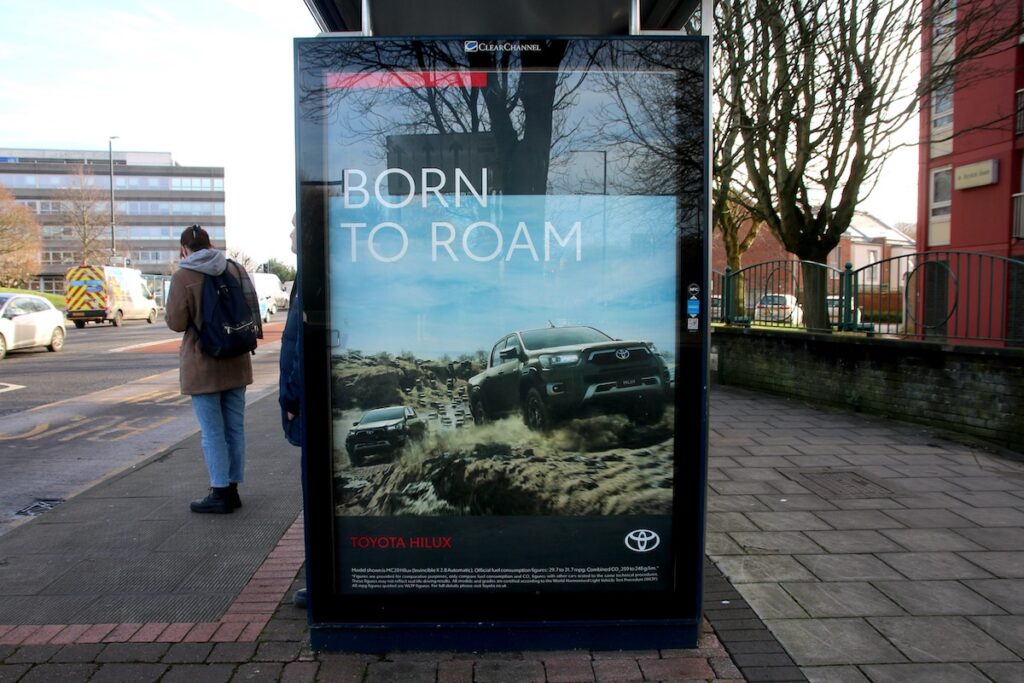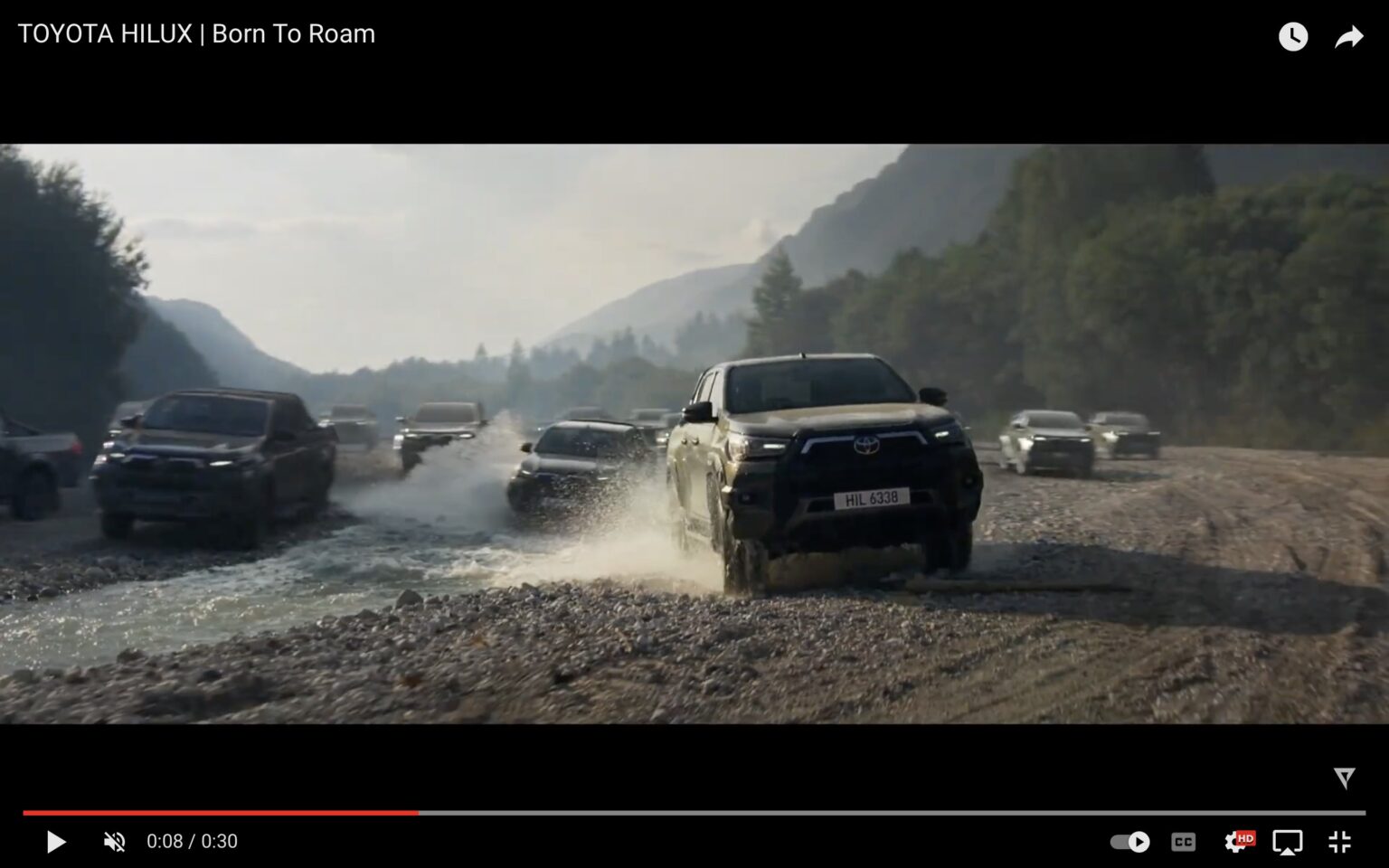The UK advertising watchdog has banned two adverts for Toyota SUVs, ruling that images of cars racing over plains and through rivers condoned a style of off-road driving that “disregarded” the impact on nature.
Climate advocates calling for tighter rules on advertising of heavily polluting products welcomed the Advertising Standards Authority’s (ASA) move — the first time it had banned SUV ads for promoting driving that harms the environment.
The adverts “had not been prepared with a sense of responsibility to society,” the regulator found in a ruling published on Wednesday, made in response to a complaint by campaign groups.
The banned ads included a Facebook video showing SUVs roving across the landscape in unison, before joining a tarmacked road, with a voiceover saying: “One of nature’s true spectacles.”
The other banned ad was a poster, used at bus stops, stating “BORN TO ROAM” next to an image of two SUVs driving on a rocky incline in a savannah style landscape. Around 50 identical SUVs appeared in a large pack on a hilly background.

The regulator said the images of cars driving across wild plains and through rivers, with dust and scree “visibly disturbed”, condoned the use of vehicles in a manner that “disregarded their impact on nature and the environment.”
The series of ads were made by the ad agency The&Partnership, The Drum reported. The agency also works with British Gas, according to Clean Creatives’ annual “F-List” report documenting contracts between advertising and public relations agencies and fossil fuel companies.
The&Partnership is owned by WPP, one of the largest media groups in the industry. According to Clean Creatives, WPP has held 55 fossil fuel contracts since the start of 2022, including with oil and gas producers such as Shell, BP, ExxonMobil and Saudi Aramco.
WPP has pledged to reach net zero emissions by 2030, but campaigners have questioned how this can be truly achieved whilst their agencies continue to encourage high-carbon activities — such as buying SUVs — through advertising. These kinds of climate impacts from advertising have been defined by campaign group Purpose Disruptors as “advertised emissions.”
“If the ad industry continues as normal, then the more ads we see or hear, the more we’re influenced to buy,” Purpose Disruptors co-founder Jonathan Wise wrote in an article for trade publication Campaign in July. “Each product made generates carbon emissions, from the production and extraction of the materials it’s made with, to how it’s transported, to the energy use it requires in its lifetime. If we celebrate the growth that advertising drives, we have to take responsibility for the emissions associated with that growth.”
‘Autobesity’
The ASA made the ruling in response to a complaint lodged by Adfree Cities, a coalition of groups seeking to remove advertising from public spaces, and Badvertising, a campaign set up by the New Weather Institute to introduce a tobacco-style ban on high carbon ads to stop the advertising industry fuelling the climate emergency.
“Toyota’s attitude to social and environmental responsibility skidded off the road years ago, after its early introduction of a hybrid vehicle,” said Andrew Simms, co-founder of Badvertising.
“Since then not only has it lobbied to block the road to climate action and slow the greening of vehicles, it has been part of the profit-driven push to ‘autobesity’ — using big ad campaigns to get drivers to switch to bigger, more polluting and dangerous SUVs,” Simms said.
Veronica Wignall, a co-director at Adfree Cities, described the ruling as another “grain of sand in a rapidly tipping hourglass of public opinion that is realising advertising agencies’ deep complicity in climate breakdown through their work to promote and greenwash their polluting clients.”
“Despite attempts to hide their dodgy PR work behind their own PR efforts, agencies need to recognise that spinning for the planet’s top polluters like HSBC, Shell and Toyota is not only unethical but a legal, regulatory and reputational risk that isn’t going away any time soon,” Wignall told DeSmog.
Wignall said the ASA’s ruling would not be enough to deter future SUV advertising, and called for an outright ban.
In a defence of the ads submitted to the ASA, Toyota had argued that it took environmental concerns seriously, and that the creation of the video sequence — shot on private land in Slovenia — had not harmed any ecologically sensitive habitat or wildlife.
“Toyota believed no reasonable viewer would have understood the ad as encouraging UK consumers to drive irresponsibly in the UK countryside and cause environmental harm,” the company said in its statement to the ASA.
This story was originally published on Wednesday, November 22, 2023, at 06:33 PST, and was subsequently updated with additional reporting.
Subscribe to our newsletter
Stay up to date with DeSmog news and alerts






